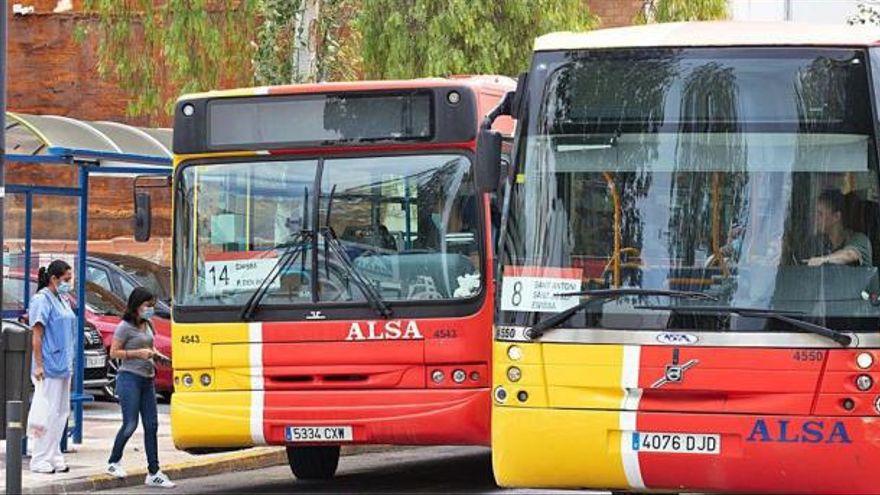The Consell de Govern approved yesterday, in an extraordinary session, the Decree Law of urgent measures to alleviate the economic and social crisis produced by the effects of the Russian invasion of Ukraine, which complements the measures of the central Government. It consists of 25 initiatives with an investment of 100 million Euros, of which 12 million will be destined for public transport on Mallorca. In this sense, the plan does not include any specific economic reinforcement for the Ibiza, Formentera and Menorca sectors.
During her appearance on Monday to present the shock plan, the President of the Balearic Executive, Francina Armengol, explained that “on the islands we can help the most fuel-dependent sectors and offer more efficient mobility alternatives”. For this reason, she detailed a series of measures that will improve the service on Mallorca, which include increasing the connections and frequency of buses and trains and maintaining the fares “and that it is the Administration, and not the user, who will bear the rising cost of energy” , among others. “We want this energy crisis, which has already led us to improve the service, to accelerate the increase in the number of public transport users,” Armengol stressed.
When asked why the rest of the islands will not receive a single euro in this regard, the Department of Mobility pointed out that “the Govern acts where it has juristiction, which is in public transport on Mallorca”. On the rest of the islands, they add, “the juristiction is transferred to the Consells”. Explanations that do not convince the Consell de Ibiza, which describes the situation as “unfair”.
According to the councilor of the sector, Javier Torres, “if we are not offered resources or legally empowered to apply measures, it makes it very difficult for us to be able to carry out certain actions, even though we have the competence”.
For their part, Govern’s Mobility Department insists that the Consell “has not made any request to cover fuel costs in the area of mobility”; something that Torres assures that they have not been offered. “We did not know that they were going to provide reinforcements or that they were going to carry out improvements to public transport. If they had told us to make a proposal, we would have done so,” he laments.
For the Transport Councilor it is not acceptable that the Balearic Executive “allocates extraordinary resources to implement measures to compensate for public transport costs [according to the Govern, the aim is also for citizens to use their cars less and spend less] and then does so on one island and not on the rest”.
Torres stresses that the margin they have from the institution only allows them to make small actions. “The big ones imply a cost. The Balearic Govern says it is only authorised on Mallorca, but one of its responsibilities is to finance the councils. If they give resources to transport on Mallorca, I understand that they have had to take away from somewhere else that would affect all the islands,” he says.
Precisely, Més per Menorca (which governs the island’s Consell together with the PSOE) demanded that the Govern provide 1.5 million euros to improve public transport after learning that Mallorca will receive 12 million euros, considering that “all citizens of the islands have the same rights to benefit from this aid”. Just 24 hours later, the Consell de Menorca announced new measures, such as free travel for children under 18 (which in Eivissa has been free since 2018, also for those over 65) and the increase in frequencies. The Consell de Eivissa assures that this summer the pre-pandemic “normality” will be recovered, with all the lines that were merged and those that stopped running.
Public Transport Rebalancing
At the same time, the Department of Mobility highlights that “support has been extended to the councils so that they can improve the service they provide through European funds so that they can update the costs of their licenses”. In this way, Torres recalls that Ibiza received 3.5 million euros in funds from the central government, “which the Govern refused to compensate financially”, to enable a rebalancing for the concessionaires of regular passenger transport at their own risk.
This figure was requested to compensate the losses of 2021, but “they denied it again and the Pedro Sanchez’s government did not enable extraordinary items like the previous year due to the pandemic”, so the Consell expects to have to pay about 2.5 million euros in this regard.
Now the context is different, says Torres, and explains that they have asked the Govern, although not yet formally, for a new rebalancing to compensate for the rise in costs in the sector. “We have put forward an idea that involves taking 2019 as the last year of reference, when prices were more normal, to compare them with those of now with the increase in fuel, tires, etc., and subsidize that difference”, he explains.
The conseller explains that they have to agree it with Menorca. “They say that a decree has to be made for everyone, but we know that Menorca is in less of a hurry than we are,” he adds. The situation is not the same because Ibiza has a larger population and, therefore, more people who use the transport. Even so, he is confident that the Balearic Govern is in a position to issue a decree for this rebalancing.
For the full article, please visit Diario de Ibiza website here.

